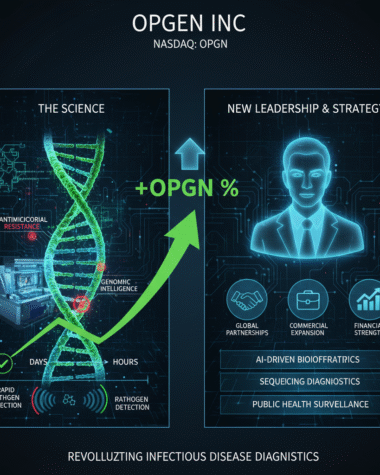Cidara Therapeutics Inc. (NASDAQ:CDTX) is a biotechnology company dedicated to the discovery, development, and commercialization of novel anti-infectives and immunotherapies designed to address serious diseases. Headquartered in San Diego, California, the company has built its reputation around its proprietary Cloudbreak® drug-Fc conjugate (DFC) platform, which merges the targeting power of small molecules and peptides with the immune engagement capabilities of the human antibody Fc domain. This unique approach enables the creation of long-acting therapies that can be applied across viral, bacterial, and oncologic diseases, offering an entirely new paradigm in treatment and prevention.
Since its founding in 2012, Cidara has focused on addressing the limitations of traditional therapies, particularly in infectious disease where resistance, limited efficacy, and short durations of protection remain challenges. One of its earliest programs was rezafungin, a next-generation antifungal, which advanced through clinical trials and was eventually partnered with Mundipharma for commercialization outside the U.S. This collaboration allowed Cidara to sharpen its focus on high-value pipeline opportunities while reducing development costs. The company’s more recent emphasis has shifted to leveraging Cloudbreak® for viral and immuno-oncology applications, positioning it as a key innovator in these growing fields.
The company’s lead candidate, CD388, represents one of the most advanced applications of its platform. Designed as a non-vaccine, long-acting antiviral prophylactic for seasonal influenza, CD388 has already shown strong potential in clinical trials. Unlike conventional vaccines that depend on immune system priming and are subject to seasonal mismatches, CD388 delivers direct, consistent antiviral protection with a single subcutaneous injection that could last an entire flu season. Positive Phase 2b results have set the stage for an accelerated Phase 3 program, supported by the FDA, with the potential for a single pivotal trial to be sufficient for regulatory approval. This positions CD388 as a breakthrough candidate in a market that sees billions of dollars spent annually on seasonal flu vaccines with variable effectiveness.
Beyond influenza, Cidara is also advancing candidates in immuno-oncology, including therapies targeting CD73 and other pathways implicated in tumor immune evasion. These programs are early in development but represent the broader potential of the Cloudbreak® platform to generate pipeline diversity and long-term growth. The modularity of the technology means that new candidates can be engineered relatively quickly, creating opportunities across multiple high-value therapeutic areas.
Financially, Cidara has bolstered its position through strategic financings, raising hundreds of millions of dollars in 2025 to ensure it has the runway to execute its late-stage trials. With over $500 million in cash and equivalents on its balance sheet following its latest raise, the company is well-equipped to manage the costs of Phase 3 development and regulatory engagement. This capital strength not only reduces dilution risk for investors but also enhances the company’s ability to negotiate partnerships and maintain independence as it advances toward commercialization.
With a history of innovation, a validated and flexible technology platform, a lead asset on the cusp of a pivotal Phase 3 trial, and strong financial backing, Cidara Therapeutics is emerging as a potential leader in both antiviral prevention and immune-based therapies. Its strategic focus on CD388 could redefine the standard of care in influenza prevention while also serving as a proof point for the broader Cloudbreak® pipeline, setting the stage for long-term value creation in infectious disease and oncology.
Cidara Therapeutics’ Accelerated Path Toward Phase 3
Cidara Therapeutics, Inc. (NASDAQ: CDTX) is rapidly becoming one of the most closely watched names in the biotech sector thanks to its innovative Cloudbreak® platform and its lead candidate CD388, a groundbreaking antiviral being developed as a non-vaccine preventative for seasonal influenza. The company has recently announced that it will accelerate the launch of its Phase 3 trial by six months, positioning the program to begin in time for the fall 2025 flu season. This acceleration follows productive discussions with the FDA, giving the company an earlier-than-expected opportunity to demonstrate the potential of CD388 in a large-scale, global, multicenter study.
The significance of this acceleration cannot be overstated. In an industry where clinical development timelines often stretch for years, shaving off half a year in a pivotal study gives Cidara a competitive edge in moving closer to commercialization. Investors and analysts alike have taken notice, as this milestone not only shortens the path to a potential Biologics License Application (BLA) submission but also increases the likelihood that CD388 could reach patients sooner than expected.

CHECK THIS OUT: Saudi Arabia Wants CEL-SCI (CVM)’s Multikine Now! and Aligos Therapeutics (ALGS) Doubles Cash to $122.9M.
Expanding Eligibility to Adults Over 65
Another major catalyst for Cidara is the expansion of the Phase 3 trial’s eligibility criteria. The company has broadened the patient pool to include adults over 65 years old, regardless of co-morbidities. This shift is transformational for the commercial potential of CD388, as it effectively doubles the target population in the United States from roughly 50 million to over 100 million people. The elderly population is particularly vulnerable to seasonal influenza, which is associated with high rates of hospitalization and mortality in this demographic. By designing CD388 as a single subcutaneous injection capable of providing protection across an entire flu season, Cidara is addressing one of the most pressing public health needs in a way that traditional vaccines often fail to achieve.
This expansion of the trial population also positions CD388 to capture a much larger share of the influenza prevention market, which is already valued in the billions of dollars annually. If Phase 3 results are positive, Cidara will have a powerful case for broad adoption, particularly in populations underserved by current vaccine technology.
Positive Phase 2b Data Sets the Stage
Confidence in CD388’s potential is grounded in the strong results from the Phase 2b NAVIGATE trial, which produced positive topline data earlier in 2025. In that study, CD388 demonstrated efficacy rates as high as 76% in protecting against symptomatic influenza over a 24-week period, providing a proof-of-concept that supports advancing into Phase 3. The NAVIGATE trial also highlighted the convenience of a single-dose administration, differentiating CD388 from vaccines that require annual reformulation and repeated injections.
This robust dataset gives both regulators and investors confidence in the potential of CD388 to achieve its endpoints in Phase 3. Moreover, the fact that the FDA has agreed to allow the Phase 3 program to move forward with the possibility that a single successful trial may be sufficient for BLA approval adds tremendous value to the investment thesis.
Trial Design and Regulatory Advantage
The upcoming Phase 3 trial will be a global, multicenter, randomized, double-blind study, enrolling approximately 6,000 participants. This design is intended to provide high-quality, statistically significant data that regulators can rely upon to evaluate CD388’s safety and efficacy. Importantly, the study also includes an interim analysis planned after the Northern Hemisphere flu season, which will allow the company to reassess trial size and powering assumptions. This adaptive feature provides flexibility and risk management, ensuring that the trial remains efficient while still delivering the robust data needed for approval.
If the interim analysis validates earlier results, Cidara could achieve regulatory milestones faster than expected, increasing the likelihood of accelerated review and eventual approval. This adaptive trial design is another example of how management is strategically positioning CD388 for success.
Market Opportunity in Influenza Prevention
The influenza prevention market is one of the largest recurring opportunities in infectious disease, with billions spent annually on seasonal vaccines that often have variable efficacy ranging from 40% to 60% depending on strain match. CD388 has the potential to disrupt this landscape by offering consistent, long-lasting protection in a single dose. Its unique mechanism of action also makes it appealing for high-risk populations who may not respond as well to vaccines, including the elderly and immunocompromised.
By targeting a broad U.S. population of more than 100 million eligible individuals and potentially millions more worldwide, CD388 represents a commercial opportunity that could generate blockbuster revenues if successfully developed and approved. Analysts have already recognized this upside, with several firms increasing their price targets on Cidara stock following the Phase 2b data and Phase 3 acceleration announcement.
Financial Strength to Execute
Cidara has positioned itself well financially to execute this ambitious Phase 3 program. Following its capital raises in 2025, the company reported a cash balance of over $500 million, giving it ample runway to complete the trial without the immediate need for additional dilution. This financial strength is critical for biotech investors, as it reduces funding risk and ensures the company can maintain momentum toward regulatory milestones. The strong balance sheet also provides Cidara with flexibility to invest in its broader Cloudbreak® platform and explore additional therapeutic applications beyond influenza.
Risks and Considerations
While the bullish thesis for Cidara is compelling, investors should remain aware of the risks inherent in biotech development. Clinical trials can fail or produce less robust results than expected, and the expanded inclusion criteria may introduce new variables that complicate efficacy outcomes. Additionally, regulatory authorities may still request further trials or data before granting approval, even if Phase 3 is successful. Competition from mRNA-based universal flu vaccines and other antiviral strategies also remains a factor. Nonetheless, the acceleration of the Phase 3 program, the expansion of the eligible population, and the strength of the Phase 2b data provide a strong foundation for optimism.
Conclusion: A Bullish Case for Cidara Therapeutics
Cidara Therapeutics is advancing a program that could fundamentally reshape how seasonal influenza is prevented, particularly for vulnerable populations. With Phase 3 starting earlier than expected, a dramatically expanded eligible patient base, and the possibility of BLA approval from a single pivotal trial, CD388 represents one of the most exciting late-stage assets in the biotech sector. Backed by strong financials and promising data, Cidara is well-positioned to deliver value to both patients and shareholders. For investors looking for exposure to a biotech with near-term catalysts and blockbuster potential, Cidara Therapeutics stands out as a compelling bullish opportunity in 2025.
READ ALSO: Exact Sciences (EXAS) Just Made Cancer Detection 100x Easier! and Soleno Therapeutics (SLNO): The Biotech Company That Could Make You Rich.








